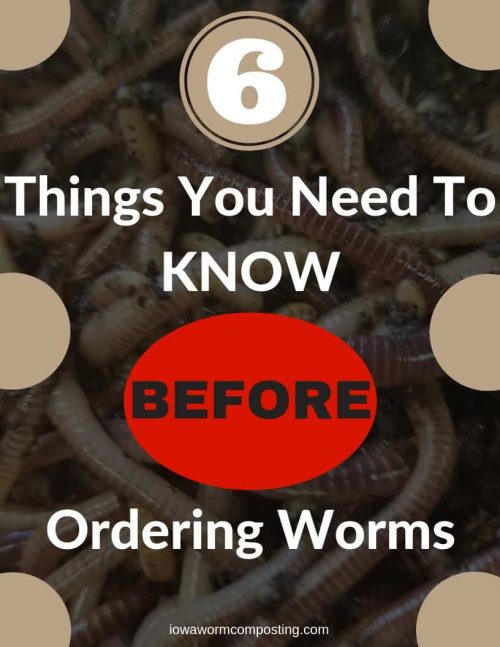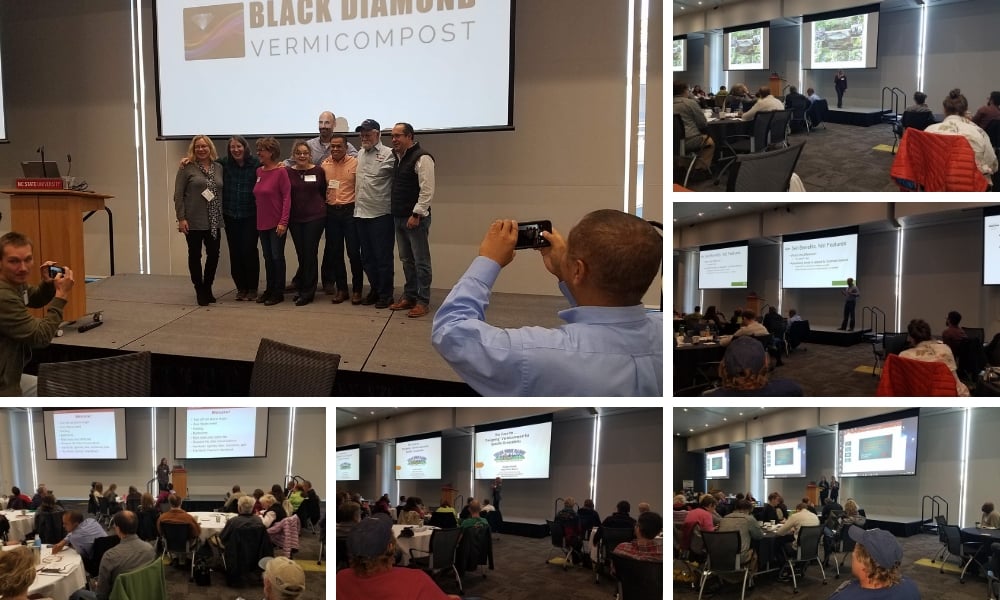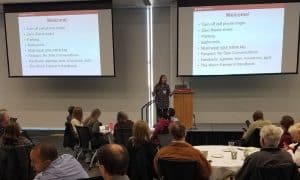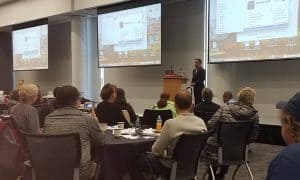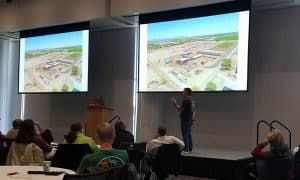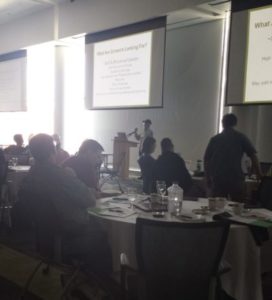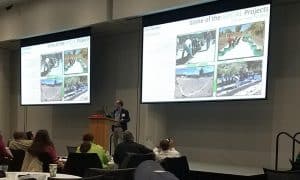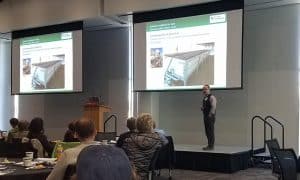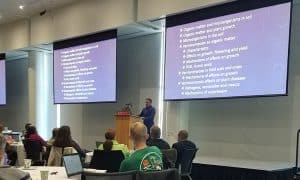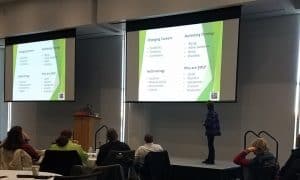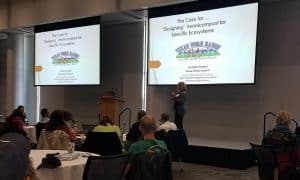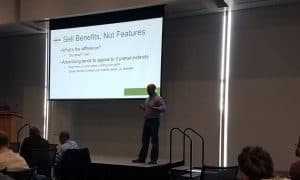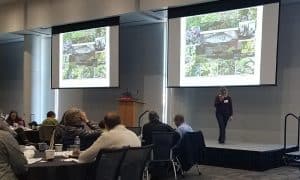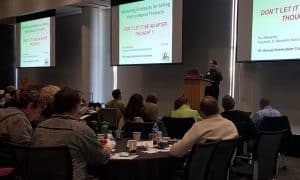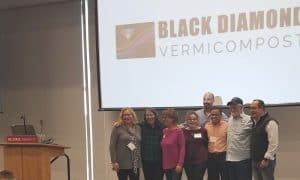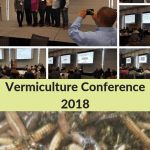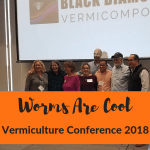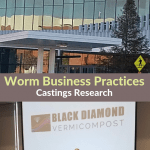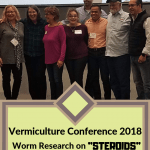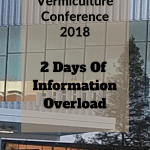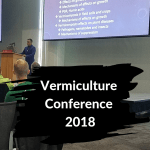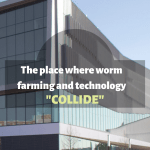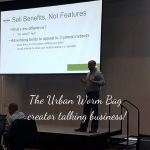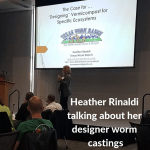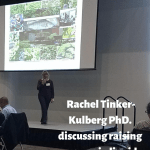Vermiculture Conference 2018
The annual Vermiculture Conference was held November 10-11, 2018 at the James B. Hunt Jr. Library on the campus of North Carolina State University.
This is the 19th year that Rhonda Sherman has organized and presented the Vermiculture Conference. Rhonda Sherman is also in charge of the Composting/Vermiculture Extension at North Carolina State University.
Ms. Sherman is probably the foremost aggregator of worm and worm business knowledge in the world. She has spent years meeting and talking with worm business owners from around the world. Rhonda knows and is familiar with the operations of most of the world’s largest worm businesses.
She brings business owners and researchers together once a year. They share their knowledge of different aspects of their business and research. This year was no exception.
Rhonda presented a line-up of business owners and researchers that gave interesting and in-depth presentations of their particular niche in the Vermiculture Industry.
Disclaimer:
This Blog Post is a WILDLY condensed version of 11 speakers’ presentations over the course of two jam-packed days. There are times that I have to draw conclusions from the data presented (research especially). Any errors are my own.
There is also no intention to slight any of the speakers. They worked hard preparing and delivering their presentations. If my reporting draws a different conclusion from their intended presentation, I sincerely apologize.
One other point: There is no substitute for actually attending the Vermiculture Conference. People who are serious about the worm business should be attending the Vermiculture Conference every year.
Vermiculture Conference – Rhonda Sherman – Hostess
Rhonda Sherman took the podium and kicked things off. She welcomed everybody and did the usual house-cleaning with the schedule, etc.
She also announced that she was releasing her latest book: The Worm Farmer’s Handbook: Mid- to Large-Scale Vermicomposting for Farms, Businesses, Municipalities, Schools, and Institutions. The book was for sale at the Vermiculture Conference.
Bonus Content: I purchased Rhonda’s book and have read it cover-to-cover. Twice since returning from the Conference. The book is very, very good. It is a must-read! I absolutely give it 5 stars! The book is available for purchase at Amazon and there is also a very good review of the book there.
Vermiculture Conference – First Speaker
Norman Aroncon Ph.D. – University of Hawaii-Hilo
“Vermicompost Effects on Plant Growth, Suppression of Diseases and Pests”
Norman Aroncon Ph.D. is a Rockstar! Literally… He sings, dances, acts and is one of the foremost worm castings, worm castings tea researchers in the world. I have not observed him walking on water yet… but wouldn’t bet against it!
When Norman speaks.. people listen because he knows what he is talking about. He is also one of the nicest guys you will ever meet.
Norman’s presentation lasted a couple of hours and then there were many questions. His slide show was a 103- page Pdf. You are going to get a VERY brief synopsis here.
He started out talking about the composition of healthy soil. Healthy soil is 25% water, 25% air, 45% mineral particles, and 5% organic matter. The 5% of organic matter consists of 80% humus, 10% roots, and 10% organisms.
Microorganisms
A teaspoon of healthy soil contains 100 million-1 billion individual bacteria! Norman spoke about the role that microorganisms play in the soil.
Contributions of Microorganisms in soil:
Fragmentation of organic matter
Increase surface area of soil
Decomposition
Make nutrients available
Humification
Incorporate feces into organic matter and soil
Aid in the formation of soil aggregates
Manage populations of other microorganisms
Vermicomposts and Vermicasts
Norman talked more about the soil food web and how all of these things play a role in the big picture. He then showed us the definition of vermicomposts/vermicasts:
Are stabilized organic matter that is produced by the interaction of worms and microorganisms under controlled conditions.
Characteristics of vermicomposts/vermicasts:
Fine particulate structure
Granulated
Large surface area
High water holding capacity
High nutrient holding capacity
Chemical characteristics:
pH is near neutral
Holds plant available nutrients
Contains plant growth hormones (GA and Auxins)
Contains Humic acids
Biological characteristics:
High Microbial Populations
* active fungi
* active bacteria
High Microbial diversity
Vermicompost and Plant Growth
Dr. Aroncon discussed the effects that vermicomposts/vermicasts have on plant growth. They are:
Accelerated seed germination
Increased seedling growth
Enhanced rhizome growth
Early flowering
Bell-Shaped Curve
Vermicomposts/vermicasts exhibit a bell-shaped curve with plant growth. Too much vermicast can inhibit plant growth. This was not understood for a while but researchers concluded that it is excessive plant hormones to blame.
Vermicomposts/vermicasts also have humic acids. This helps the plant hormones persist in soil. 400g of vermicompost yields about 1g of humates.
Norman showed some of their plant growth studies where different amounts of vermicomposts/vermicasts were used. The bottom line was that about 20% by volume to the soil mix was the “sweet spot” for the best plant growth and yield.
Vermicast and Disease Suppression, Pest Deterrence
Dr. Aroncon switched gears and started talking about disease suppression and pest deterrence from the use of vermicomposts/vermicasts. There was a TON of material presented.
It is much too long to go over. My take was that while vermicomposts/vermicasts did show notable results, it is not a panacea against pests and disease.
Disease suppression and pest deterrence is a definite case-by-case basis. Different percentages of vermicasts were used to produce the best results.
Norman concluded his presentation and a lengthy question and answer period ensued.
Vermiculture Conference – Second Speaker
Zach Brooks – Arizona Worm Farm
“Economics of Worm farming: Revenue Model for Producing Vermicompost, Tea, and Compost”
Zach Brooks is kind of the “New Kid on the Block”. He had a successful career and decided to retire early (still a young guy) and live (WORK!) his dream. His dream is to have a self-sustained farm in the Arizona desert near Phoenix.
He and his wife are living and working his dream. Zach is financially independent but his goal is to take in more revenue than he pays out in expenses.
Opens His Books
Mr. Brooks was very open about his operation and basically opened up his books to the group. It was an interesting presentation indeed! The numbers are pretty interesting but before we get to that… some information about his operation is in order.
Zach lives next to a major metropolitan area making some of these numbers possible in his first year. He also does not sit on his hands. He has a facility manager and a couple of employees to help out.
Arizona Worm Farm sells worms, worm castings, worm castings tea, compost, mulch, conducts worm composting classes, collects tipping fees from vegetable producers and stables, sells black soldier fly larvae, sells eggs, vegetables, does zero-waste events, conducts eco-tours, offers hosted meals, and does some consulting.
THAT was a long sentence because Zach is a very busy guy!
The Bottom Line
Now for the numbers:
Revenue this year: 202,000.00
Expenses this year: 183,000.00
Net 19,000.00
The good news is that he is revenue positive. The bad news is that these figures do not include 109,000.00 in capital investments (equipment, buildings, etc,). Farmland that was purchased is also not included in these figures.
Zach is still a long ways from having a profitable business. It is a good start though and will get better in time.
The moral of the story: The worm business is not a get rich quick scheme. It takes a lot of hard work, proper planning, capital, hard work, and a little luck to make it in this business.
Did you notice that hard work was used twice in that last sentence? I wanted to make sure you did not miss that part!
Working for less than minimum wage is also a big plus! Zach’s talk was very eye-opening indeed!
Vermiculture Conference – Third Speaker
Mark Purser – The Worm Farm – Durham, Ca.
TV’s “Blue Collar Millionaires: “A Whole Can of Worms” Star Shares Path to Success”
I have heard Mark Purser speak a few times and just can’t get enough! Mark Purser is a totally unassuming guy with the gift of gab. He is your neighbor next door, the guy down the block, and just your normal Joe.
Yours Truly has never asked but would bet a LOT of money that Rhonda wrote the title of his presentation. Heck, he doesn’t even have a presentation. Mark just gets up there and talks about how lucky he is.
I am not so sure about the “LUCK” part. The definition of “luck” is: Preparation + Opportunity = Luck Mark did plenty of preparation (ie hard work) and the opportunity came along.
He was also smart enough to realize an opportunity when he saw one. Mark Purser runs his operation under the following principle: Find out what your customers want…. and then give it to them.
Successful Soil Mix Business
It really is that simple. Simple, but not easy. Mark has a wildly successful soil mix business. He now has a fleet of 10 trucks that deliver his soil mixes all day, every day.
Mark orders compost, soil amendments, bat guano, coconut coir, peat moss, etc. by the trainload. He operates on a 40-acre ranch with worms in windrows for their castings. No high tech operation here.
He uses all of his (and more) worm castings in his soil mixes that his customers can not get enough of. Mark also sells worms… a lot of worms.
Mr. Purser gives back too. He runs tours of his operation for school kids and the public. You can tell how much he loves those tours by just listening to him talk about it.
He credits his success to being in the right place at the right time (cannabis growers) but that isn’t the whole story.
I believe that Mark Purser is a very hardworking and really smart guy.
Vermiculture Conference – Fourth Speaker
Francisco Niembro – Grupo Aldea Verde Mexico
“Building Massive Vermicomposting Operations in Mexico”
Francisco Niembro is a classy, charismatic guy that is a joy to be around. Francisco can light up any room he is in. He also is the guy in charge of one of the largest vermicomposting ventures in the world.
When Mr. Niembro talks about operating and designing “Massive” composting/vermicomposting operations. That is an understatement.
Grupo Aldea Verde has a couple of main divisions. The first division is their production and marketing of composting worms, compost, vermicompost, and worm castings tea/extracts.
The company’s second main division is their project development. They plan and develop large composting and vermicomposting projects in Mexico, the Caribbean, and Latin America.
Project Development Process
Their process consists of 5 main parts and is virtually turn-key for their clients.
1) Initial Questionaire (material to be processed, amount, aspirations for the end product)
2) Design (define the need of the civil works, infrastructure, buildings, equipment, training, and regulatory compliance)
3) Building the site (work hand in hand with the construction engineers building and equipping the facilities)
4) Startup of the site (work and train the people to start processing the waste)
5) Follow up (the team makes many follow up visits to continue training and to ensure the quality of the final processes)
Example Projects
Here are a few examples of projects that Grupo Aldea Verde has designed:
Agave Bagasse – 300 tons/day waste that produces compost and vermicompost
Green House Waste – 50 tons per day producing compost and vermicompost
Palm Oil Extract – 80 tons per day of waste producing compost and vermicompost
Manure and Hay – 500 tons per day producing compost and vermicompost
Grupo Aldea Verde has designed and helped develop projects that process over 5000 tons per day of organic wastes into marketable products.
One of their current projects is designing a vermicomposting facility and operation for a resort in Cancun. The resort generates 8 tons per day of food wastes and would like to turn those wastes into vermicompost.
Social Projects
Grupo Aldea Verde does not just design large projects. They have worked with the Mexican government to design and install smaller vermicomposting operations. These are social projects to help small villages and farmers.
The Company has designed 13 of these social project sites to date. Francisco emphasized that although they have a base model for these sites, none of them are exactly the same.
Land and resources are different in every case and some design changes are necessary.
Francisco also talked about the benefits to society from Vermiculture. Vermiculture can be a path to better food security, human well-being, mitigation of climate change, and aid in the recovery of depleted soils.
Vermiculture Conference – Fifth Speaker
Dan Lonowski – Michigan Soil Works Mich.
“Designing Continuous Flow-Through Worm Bin Systems”
This was my first time meeting Dan Lonowski and hearing him speak. Dan is a gregarious, out-going guy who always has a smile on his face.
He is a mechanical engineer and has just started Michigan Soil Works. MSW produces and sells a modular CFT System.
My understanding is that the CFT units are available in 8-foot lengths and can be added to as your business grows. This a very enticing concept.
Dan took the podium and really didn’t talk much about his newly designed machine. He took us on a little history lesson about how Continuous Flow-Through Worm Bin Systems came to be.
Continuous Flow-Through Systems
The first patent for a CFT was filed in 1982. This is relatively new technology but it has advanced a long way in about 35 years. He told us that Dr. Clive Edwards (The Ohio State University and renown vermiculture researcher) was the Father of the CFT’s that we know today.
He showed us slides of early designs and some of the more modern designs through the years. Dan also discussed some of the problems inherent to the CFT System.
The cutter bar has been a major problem with many of the CFTs. They tend to twist when harvesting and break their cables or chains. This can be a huge problem when you have to empty tons of worms and castings to repair the assembly.
Dan talked about researching the designs. He was then able to design and build a cutter bar assembly that is more dependable.
He had one of his cutter bar assemblies on display. Dan explained how the design is an improvement over other existing designs.
Vermiculture Conference – Sixth Speaker
Norman Aroncon Ph.D. – University of Hawaii-Hilo
“Pest and Disease Suppression Using Aqueous Extracts from Vermicompost (Teas)”
Norman Arancon took the stage for his second presentation and only had an 80-page presentation today. You are going to see a mightily condensed version of his talk.
The National Organic Standards Board defines tea as:
A water extract of compost produced to transfer microbial biomass, fine particulate organic matter, and soluble chemical components into an aqueous phase, intending to increase or maintain the living, beneficial microorganisms of the compost. Compost teas can be applied without restriction if a microbial enhancer is not used. (ie molasses, sugars, etc.) If you use an enhancer, your compost must conform to fecal bacteria limits. (ie e coli, salmonella, etc.)
The teas that were tested include:
Thermophilic compost tea
non-aerated vermicompost tea
aerated vermicompost tea
aerated vermicompost tea with microbial enhancers
control – water
Plant Growth Testing
Plant growth – any tea that had vermicompost (in any amount) out-performed the control and thermophilic compost teas. (5%, 10%, 20%, tested)
Any aerated tea out-performed any non-aerated teas.
20% (1-gallon castings, 4 gallons water) out-performed 5% and 10% teas.
Pest Deterrence and Disease Suppression
Pest and Disease Suppression – There were some notable improvements but just like vermicompost… vermicompost teas are not a panacea for pest and disease suppression. Improvements were on a case-by-case basis. There was virtually no eradication, just some improvements.
Worm Tea Shelf Life
Shelf Life of Worm Teas – Room temperature storage of vermicompost teas:
50-75% reduction of microbial activity by 7 days. Stays relatively stable out to 21 days in the same range.
My conclusion: Vermicompost teas should be used as quickly as possible if you are going to store at room temperature.
Cold storage of vermicompost teas:
Microbial activity was stable from Day 0-7. By Day 14 microbial activity had increased by 100%. Somewhere between Day 14-21, the microbial activity dropped to nearly zero.
My conclusion: Cold storage of vermicompost teas is a viable option. The shelf life is increased to two weeks.
Worm Teas as a Seed Stimulant
Seed Stimulant – This was very interesting research to me. Various concentrations of vermicompost teas were tested on seeds. Soak times were also tested.
These are the results: A 1% solution of vermicompost tea performed best. (Made from a 20% tea and take 1 part of that to 99 parts water)
A soak time of as little as 1 hour produced stellar results. 8-24 hours were the best.
The 1% worm tea solution was the best seed germination percentage, plant and root growth after germination.
Norman also talked about using vermicompost teas in a hydroponics operation. Research shows that nutrient levels for some plants can be reduced 50-75% while exhibiting the same growth and yields.
Vermiculture Conference – Seventh Speaker
Christy Christie – Black Diamond Vermicompost – Ca. Wine Country
“Building a Vermicompost Business from the Ground Up”
Christy Christie is an energetic lady from the wine country in California. She took the podium and told us the story of her business from the ground floor. Christy decided to make a career change in 2009 and her sister suggested the worm business.
She knew nothing about worms and started to do her research. Christy found the information to be hit or miss on the internet. Then she found Bentley Christie (no relation) of redwormcomposting.com and the Worm Farming Alliance.
Long story short.. she found the Vermiculture Conference, attended, and was off and running from there.
Christy talked about the trials and tribulations she had learning to raise worms and produce high-quality vermicompost. She has grown to operate a large CFT operation for the production of worm castings.
It has not been easy. There have been ongoing problems regulating the heat and moisture in her CFTs because of the hot, dry winds her area experiences.
She had just a roof over her operation (no side walls) and the wind would heat up and dry out her bins in the summer. Christy was finally forced to enclose her operation to remedy the problem.
Developing a Market
Ms. Christie also had to develop the market for her castings. She spoke about some of the things she has done to get her business noticed.
They included:
Education for garden clubs
community events
outreach programs
farmers markets
Preparing a “Presentation Book”
cross-promotions with other local businesses
TV spots
website
test plots with local farmers
social media, advertising, and more
Christy has had a long road to get to the place in her business where she is right now.
She left us all with these final words: Work hard – Dream big – Never give up
Vermiculture Conference – Eighth Speaker
Heather Rinaldi – Texas Worm Ranch Texas
“Create Designer Vermicompost to Improve Soil Ecosystems”
This was my second time meeting Heather Rinaldi. This was the first time that I heard her do a presentation.
Heather is kind of the “Mother Hen” type of person. I mean that in the best possible way! She is welcoming to everyone around her and just this ball of energy and passion.
Ms. Rinaldi runs Texas Worm Ranch and her main claim to fame is her worm castings. Her castings are GOOD and her customers cannot get enough of them.
However, Heather is really an educator. She convenes classes at her business for kids, gardeners, her customers, and anyone else interested in creating healthy soils. She is passionate about healthy soils and nutrient dense food.
I visited her website. Front and center in the Header of the Home Page is her mission statement: Our mission at Texas Worm Ranch is to educate, enable, and empower healthy people, healthy communities, and a healthy planet through healthy soil.
Heather probably has more practical knowledge of worm castings than anyone else in the worm business. When she talks about worm castings….. the smart people listen.
Heather’s Presentation
Heather began her presentation with the following disclaimer: “I can not teach you all about worm castings in an hour”.
She is a big proponent of soil testing and designing specific profiles of bacteria and fungi in her worm castings to best meet her customers’ needs. This is accomplished by using specific feedstocks and bedding materials in her worm bins.
Lab testing and on-site microscope work is a key component for success. Heather even takes her microscope to Farmer’s Markets and Fairs. She SHOWS her customers why her vermicast is better than her competitors.
Heather is a Dr. Elaine Ingham student of the Soil Food Web. The main point in her presentation was for worm castings businesses to become more educated about their product. This will better serve their customers’ needs.
Heather recommended taking classes, learning to use a microscope, and being able to interpret lab results. This was a great presentation from a very classy lady.
Vermiculture Conference – Ninth Speaker
Steve Churchill – Urban Worm Company Pa.
“Practical Advice for the New Entrepreneur: Creating, Selling, and Succeeding in a Bootstrapped Business”
Steve Churchill is a pleasant, easy-going guy that also happens to be an airline pilot. That is his “Day Job”. He also has a worm business and website.
He recently designed, manufactured, and brought to market “The Urban Worm Bag”. Steve’s presentation centered around the problems of bringing a new product to the market with limited time and resources.
He also talked about time management and the need for triage to determine the most important tasks to do immediately.
The Urban Worm Bag Story
Steve began his presentation talking about bringing his “Urban Worm Bag” to the market. He had probably over a year’s time in designing the bag, getting prototypes from the factory, and testing the new design.
Everything seemed good to go so Steve made his first order from the factory. The bags arrived and pretty much sold like hotcakes. Everything is going great and Steve’s a millionaire. (not really)
The problems started about 3 to 4 months later. The bags had been designed with a very high-quality marine-grade zipper at the bottom for ease of harvest.
After 3-4 months of moisture and castings sitting on the zipper, some of his customers could not get the zipper closed after harvesting their castings. BIG problem.
Version 2.0
Steve had to design version 2.0. He added a flap of material over the zipper (to keep the castings out) and made a few tweaks to the included stand.
Long story short.. the new design seems to have fixed the problem but Steve is not a millionaire.
Steve (to his credit) has contacted all of his customers that purchased the first version. He then offered to send them the new version free of charge.
Time Management
Steve does have a day job and the problems with the “Urban Worm Bag” created a huge time crunch for him.
Time management was very important to him and he gave the group some suggestions for managing their time better. He talked about the “80-20 Rule” and how it is so important to identify the 20% of your tasks that need to be completed first.
This was a very honest presentation and a good example of problem-solving and persevering.
Vermiculture Conference – Tenth Speaker
Rachel Tinker-Kulberg Ph.D. – Aquaponic Food 4 Thought N. Carolina
“The Sustainable Use of Earthworms to Expand Farmer Seafood Supplies and Vermi-Business Strategies and Pitfalls”
Rachel Tinker-Kulberg is an intelligent lady that has a bunch of different research projects ongoing. She presented some of her research and had some very interesting ideas.
One of her projects is a “Farm to Table” education program. She incorporates a diversified integrated urban farming model. This includes Vermiculture as part of the program to grow food and recycle wastes.
Horseshoe Crab Project
Rachel has another project involving horseshoe crabs and aquaculture. Horseshoe crabs are vital to medical research (which I didn’t know) for blood clotting studies.
Wild horseshoe crabs are collected on beaches, some of their blood drained, and released back to the ocean. Horseshoe crab numbers have been decreasing so the project involves raising them in captivity.
They need to eat and the project is trying to feed them without the use of fishmeal. Fishmeal is made from fodder fish. Fodder fish are also decreasing in numbers from overfishing.
Their solution is to feed the horseshoe crabs…worms. Fishmeal is about .50 per pound so Rachel has designed an automated machine to grow worms in a nutrient solution (patent pending).
This nutrient solution is designed to make the worms more appealing to the horseshoe crabs and grow the worms at a rapid rate.
The worms are raised in an aqueous solution (no bedding) and the machine harvests them automatically. (patent pending)
She claims to be able to raise them for less than .50 per pound. THAT would be pretty amazing…and with NO bedding.
Raised in liquid!
The Vermiculture Business
Rachel also talked about the Vermiculture business in general and the need for a good business plan before starting. This was a very interesting presentation. If her automated worm growing machine works as advertised, I might be her first customer.
Vermiculture Conference – Eleventh Speaker
Ron Alexander – R. Alexander Associates
“Marketing Strategies for Selling Vermicompost Products”
Ron Alexander is probably the most sought after compost and vermicomposting business and marketing consultant in the country. He is a real fun sucker! (just kidding)
Ron is very knowledgeable about all of the different state regulations governing vermicompost sales. That can keep you out of trouble with your labeling.
He is also a proponent of not calling worm castings vermicompost. We need to differentiate our worm castings from thermophilic compost.
Market Research
Ron talked about identifying your worm castings market and planning your business to best address that market. Market research is critical to your success because you need to find your particular niche. This will help to differentiate your business from others.
He also talked about marketing, sales, and distribution of your products but there are many options available. You need to find what works for you and your business. More regulations are coming and it is up to you to stay compliant with the new regulations.
Ron discussed getting your products organically certified and the procedures necessary for that.
Mr. Alexander also stressed the need for some type of Trade Association that represents the worm business. There is none at the moment. A Trade Association would help with having some type of standard regulations on a National basis because right now we are subject to piecemeal state regulations.
Ron Alexander is really a funny guy when he is speaking and this year was no exception. He cracked some pretty good jokes but his message was all business.
Wrapping Up with a Field Trip
Ron Alexander was the last speaker at the Vermiculture Conference. The Conference adjourned and the group made a field trip to Rhonda Sherman’s Learning Lab.
Rhonda has various worm composting systems set up at her lab. It is very interesting to get a close up look at some of the worm bin systems that you are not familiar with.
Your Speakers from Left to Right: Heather Rinaldi, Rhonda Sherman, Christy Christie, Rachel Tinker-Kulberg, Steve Churchill (back), Norman Aroncon, Mark Purser, Francisco Niembro Not Pictured: Zach Brooks, Ron Alexander, and Dan Lonowski
The Worm Farming Alliance
I would be remiss if I didn’t mention the WFA. The “Worm Farming Alliance” is an organization headed up by Bentley Christie. Bentley lives in Canada and the organization is truly international. The WFA has members from around the world.
There have been many shysters and con men in the worm business taking advantage of people over the years.
The WFA was formed for like-minded people in the worm business to bring some honesty and integrity back to the business. That is happening but the WFA is so much more.
Most of the members communicate with each other on various Facebook Groups, email, and the occasional phone call.
Problems get solved, questions get answered, customers are referred, partnerships are created, and a myriad of worm-related topics are discussed.
Eight of the twelve speakers at this Vermiculture Conference are WFA members. If you are in the worm business or planning to be in the worm business, click the link above to learn more about the WFA.
Our Man Steve Churchill
Steve Churchill arranged a WFA meet up on the Friday night before the Vermiculture Conference. The soiree was at a sports bar/restaurant near the NCSU Campus. The food was good, the drinks were better, but the company was great. Worm tales were spun late into the evening and a good time was had by all. Thank you, Steve.
Full Disclosure: This post may contain affiliate links. That is one way we keep the lights on and the website running.

